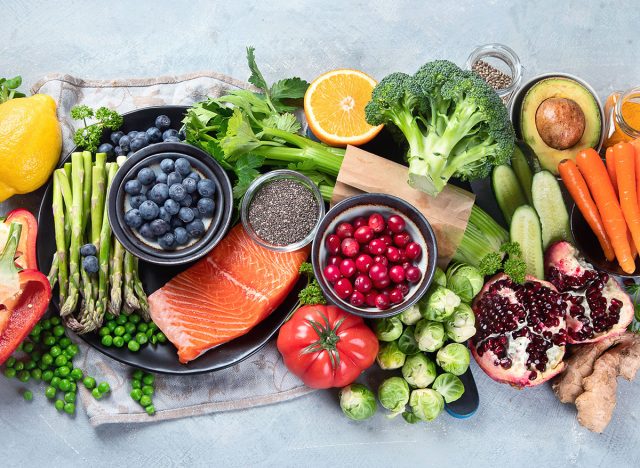Because of diet culture and companies trying to sell their products, “belly fat loss” has been promoted in extremely unhealthy, unsustainable, and sometimes dangerous ways. These fad diets and weight loss products can harm people both physically and mentally.
Flat belly teas are some of the clearest examples of this, which market themselves as helping to promote weight loss and are often made with natural laxatives that can lead to stomach and gut lining issues.
Not only is something like this potentially harmful, but it’s misleading as well. Belly fat diets may help you get rid of some bloating or shed a few pounds, but these results are temporary and never actually address the issue at hand.
So are there healthy ways to lose belly fat and keep it off, while still giving your body the nutrients and care it needs? And what does the science actually say about abdominal fat loss and how it’s connected to your diet?
Read on, and for more on healthy eating, check out 5 Best Eating Habits For Your Blood Sugar.
The different types of abdominal fat
Not all types of fat in our bodies are the same, nor do they carry the same level of potential health risk. Subcutaneous fat is the fat located just beneath our skin and outside of our abdominal wall. According to Harvard Health, subcutaneous fat makes up about 90% of our body’s fat.
Visceral fat makes up the other 10% of body fat, and this type of fat is what experts warn should be monitored. This is because visceral fat is located beneath our abdominal wall and around our abdominal organs. Too much of this type of fat has been linked to heart disease and other serious illnesses.
Unfortunately, there is no “quick fix” for visceral fat. But research suggests a healthy diet and sustainable weight loss can help you shed this type of belly fat.
A balanced, nutrient-dense diet is your best bet

While many people may be searching for that miracle solution to belly fat loss, there isn’t one. This is because even though our culture has marketed the ability to specifically target belly fat with the right foods and exercise, it’s more so about your overall weight management. And researchers have found that losing and maintaining weight loss through a balanced diet and regular exercise can also help keep visceral fat at healthy levels.
Harvard Health states that eating plenty of fiber and complex carbs like whole grains, vegetables, and protein sources like lean meat and legumes can help overall weight loss. They also suggest limiting your intake of added sugars and refined carbohydrates, as this can contribute to weight gain and therefore more belly fat.
It’s not just about your diet, though
Diet is certainly one of the major factors in weight loss. In a study published in BMC Public Health, participants that lost weight through diet and exercise didn’t actually have that much of a difference in visceral fat loss as the participants who lost weight through diet only. The exercise and diet group did see a bigger change in subcutaneous fat, though.
Exercise is still an important aspect of weight loss, as are other areas of life. Harvard lists five ways of tackling visceral fat: movement, diet, lowering stress, avoiding tobacco, and getting enough sleep.
One recent study from Mayo Clinic found that lack of sleep was in fact associated with more visceral fat. In other words, make sure you’re getting enough rest every evening.
The takeaway
Even though our society is constantly telling us that there are quick and easy ways to get rid of belly fat, the science says that it takes a more holistic approach, one that involves losing body fat in a healthy, sustainable way by making helpful changes to our diet and lifestyle.


























